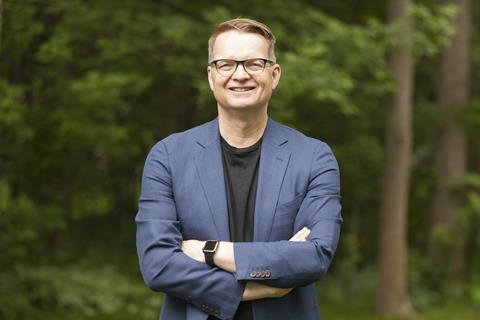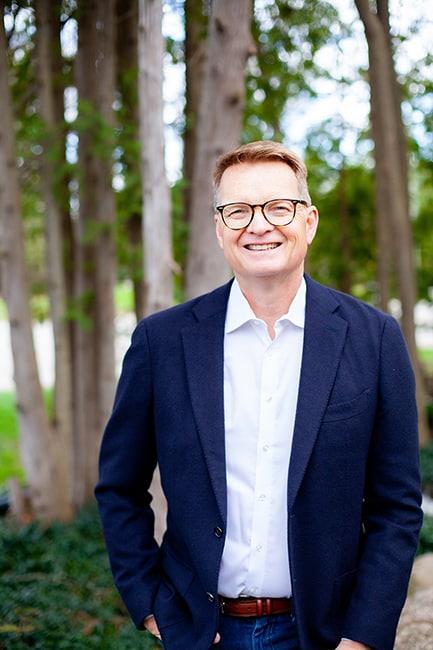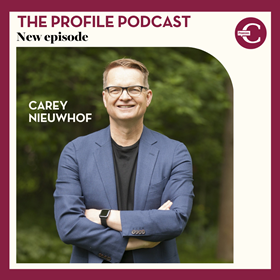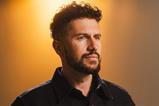The influential Christian podcaster and author opens up about his journey from lawyer to pastor, his burnout at 41, and why church leaders desperately need friends who aren’t impressed by them

Carey Nieuwhof is a bestselling author and speaker. His influential Christian leadership podcast has been downloaded more than 36 million times and his content reaches more than 1.5 million people each month.
Yet the lawyer-turned-pastor is the first to admit that his own leadership journey has been far from flawless. For years, Niuewhof says he was beholden to the grift of church growth - at the expense of his character, marriage and relationships. His congregation was growing rapidly - leading to invitations to speak around the world - but success led to sudden burnout and a reckoning in his approach to leadership.
Now, the former lawyer dedicates his days to sharing his hard-won wisdom through his books, podcast and hugely popular weekly blog.
But who is Carey Nieuwhof and what’s his story? We caught up with him to find out how he came to faith, the supernatural experience that led him to leadership, and how the Church can speak well into a deeply-divided society.
Tell us about your own faith story
I grew up in a Christian home and gave my life to Christ aged 13. I was active in the church as a teenager, but then got to college and drifted away. I wanted to have enough faith that, if anything happened and I was killed in a car accident, I’d still go to heaven - but I also wanted to have fun on earth!
Midway through my degree, I had an awakening. I realised I was riding on the coattails of my parents’ faith, living off fumes. I had to get serious – either I was going to be a Christian, or an atheist. [At that time] I didn’t know which. I made a deal with God: I’m going to read the Bible and pray daily for six months, and at the end, I’ll decide what to do.
It didn’t take six months – I got completely drawn in. I was convinced that these were the truest words I’d ever read, and I recommitted my life to Christ.
You first trained and worked as a lawyer. Why and how did you move into church ministry?
After law school, while working at a firm during the summer, I had a supernatural experience. It was a vision of me, 20 years in the future, wildly successful in law and morally bankrupt. My family was in shambles, my marriage was in shambles, my ethics were ruined.
Most leaders have no real friends
I knew in an instant, in my spirit, that law wasn’t for me. But I didn’t know what to do. I went into the library, where there was a bay window. I could see the church I grew up in. I felt this call – this voice, not audible, but almost – that said: You should be in there. The part of the church that I could see was the pastor’s study. I thought: Are you kidding me? No!
Later, I went to pick up my fiancée (now wife) to go to my parents for dinner. We’d known each other a year and never talked about church ministry. I didn’t say a word about what had happened. As we’re driving, she said: “Do you ever think of going into church ministry?”
How did you find the transition into church ministry?
When I got into church [ministry], the revelations continued. I thought: I’m a city boy, a lawyer. I should be in a downtown Toronto church that ministers to professionals. The church is good at embracing the poor, the marginalised, the sick, the hurting. But who’s talking to the people in the banks and law firms? I know how to do that.
I had an opportunity to be at a church that had that ministry. But before they offered me the job, I interviewed for a role involving three tiny, rural churches north of Toronto. It was the opposite of what I would have had in Toronto. They also offered me a job.
No matter how well our church did, or how well I did as a preacher, I wanted to do better
I didn’t know what to do. My wife suggested opening the Bible to see what God had to say. We opened it to Acts 16, and it was Paul deciding where to go. He went to Macedonia - and the one thing I knew was that Macedonia was poor.
For us, there was a rich church in Toronto and some poor churches north of Toronto. The person who called me from the churches outside Toronto said: “Why don’t you come to help us?” Similarly, the Apostle Paul has a vision of a man from Macedonia who says: “Why don’t you just come to Macedonia and help us?” (v9).
Those little churches are ten minutes from where I am now and have been for the last 30 years.

You now write about change, leadership and healthy church culture. How did that unfold for you?
Within five years of starting at those little churches outside Toronto, we had sold our original 19th century buildings, moved into a school and then built a new, state-of-the-art facility. The church in Canada is not particularly healthy, there’s not a lot of growing churches. We got more and more phone calls and messages from people saying: “How is this happening?” I kept getting invited to go and tell our story.
I also realised that I went to law school, but nobody taught me how to run a law firm - and I went to seminary, but nobody taught me how to run a church. So, 15 years ago, I started a blog aimed at helping church leaders figure out all the stuff that they didn’t learn in seminary – things I had to learn the hard way.
In 2015, I stepped back as a lead pastor of our church. I’ve been doing this full-time now for almost a decade.
In your podcast series ‘Pastoring in a Partisan Age’, you discuss leadership in an age where we’re arguably more divided than ever. What does the church have to say to these issues?
The culture right now in many places is, no matter what you do, you’re in trouble. If you speak out, you spoke out the wrong way or on the wrong side. You were too vitriolic or not vitriolic enough. You were too partisan or not partisan enough. You were silent when you should have said something, or you said something, but you didn’t say the right thing - or you said it in the wrong tone. It’s a no-win proposition.
I realised I was riding on the coattails of my parents’ faith, living off fumes
Why is conflict so inflamed? One of my theories is that 95 per cent of the conflict in the Church has nothing to do with the Church. When you get that angry email, if you really drill down, it’s about all the other things that went unaddressed over the years and have caused it to erupt on the presenting issue. That’s what’s happening in culture.
Another thing is that our belief has become our identity. God created us to have our identity in Christ. But we put our identity in all these false places, and one of them is our belief and our viewpoint. [People think]: If you’re attacking my ideas, you’re attacking me.
I really want to help leaders see that there are issues underneath the issues. If you address these, you’re going to diffuse the conflict in your church.
How should church leaders approach politics?
We’re trained in theology. We’re not experts on politics or every single social issue. If we focus on what I call the ‘Alt-kingdom’ – the kingdom that Jesus ushered in, which is not of this world but transcends the world – it will have implications for this world. It gives people a third narrative: it’s not left or right, it’s not this extreme view. As Jesus said: “among you it will be different” (Matthew 20:26, NLT).
We have to find that other narrative, because our attention has been so hijacked by the cultural narrative.
How can the Church better engage with the online space while acknowledging its dangers?
Like most things, social media makes a terrible master and a wonderful servant. We’re on our phones a ridiculous amount of the time. The amount of completely useless information that we process every day is insane. Our anxiety is off the charts.
We can go right back to the Garden of Eden. We’ve bitten the apple and now we have way more knowledge than we were ever designed to be able to sustain. God didn’t design us for that. We have this curse of knowledge: we have the knowledge of God, without the wisdom of God.
I probably went through staff faster than I had to - because nobody was good enough
It’s also important to teach people good digital hygiene. Where do you get your news from? If you’re reading it from the extreme side, read the other side as well. Or better yet, find some more reliable sources.
And then, on social media, be the person [you are] in real life. We want to be helpful. Did this help somebody? Is it going to make a difference in their lives?
Has there ever been a time when you’ve struggled to get the balance right?
All the time. There are subjects [I’ve written or spoken about] that honestly should have been for a smaller audience. Here’s one: should pastors have disclosure about who gives what to the church? I did an Instagram reel, but what nuance can you give in a 60 second reel? Very little. I posted it and the first 100 comments were very polite and nuanced. Then the algorithm picks up on the post’s traction and throws it out to the wider internet. Oh my goodness, to those who found it then, I was the worst person ever!
Are there any topics that you just would not touch?
[Discussions around] LGBT issues are difficult right now. I’m not saying it’s a subject that doesn’t need speaking into, but it’s so nuanced and challenging, and I don’t feel that’s my primary mission. Whatever you say on whatever side, you draw out many polarised people. [You have to ask:] Do you want to go 72 rounds with this [topic]?
I’ll give you an example of a non-controversial subject, and that’s discipleship. Everybody’s focused on discipleship, and I think we’re losing out on evangelism. Maybe that’s a cynical take, but I’ve had multiple offers asking me teach on discipleship. I believe in discipleship – I know it’s biblical and I’m trying to be a disciple – but I don’t have a lot of content on that. There’s people better placed than me to speak into that area.
You’ve said that you learned some lessons the hard way while leading a church. What did that look like for you?
Leading a church, it was very rapid growth in the first decade. I was in my 30s. I was a driven leader and had to prove myself. I was a performance addict. When you’re on a stage and each week there’s more people in the room than the week before, you need a massive amount of character to handle that. I didn’t have the character for it.
95 per cent of the conflict in the Church has nothing to do with the Church
No matter how well our church did, or how well I did as a preacher, I wanted to do better. There was no finish line. There was no contentment. That meant that I probably went through staff faster than I had to - because nobody was good enough. It put pressure on my marriage.
When I was 41, I burned out - and it was sudden. I had just come off of the biggest speaking engagement I’d ever done – 2,500 people in Atlanta. I got back on the plane to Toronto and, when we landed, I collapsed. I fell off a cliff. I was basically under house arrest by God for the summer of 2006. My passion was gone. My hope was gone.
I’ve spent the last 18 years trying to get healthier, trying to not hurt the people closest to me, trying to be more relationally, emotionally and spiritual healthy. It’s been so much better, because I think the old path was: the people closest to me didn’t have a great experience of me, but somebody in the back row thought I was great. Now, it doesn’t really matter what the people in the back row think, so long as my wife and I are good, my kids and I are good, my team and I are good.
How can church leaders avoid the experiences you went through?
One thing is community. You need people who are not impressed with you. Arthur Brooks wrote a great book called From Strength to Strength (Green Tree) where he talks about the difference between real friends and deal friends. Deal friends rely on me to do something for them. The alternative is real friends - and most leaders have no real friends.
I have friends who stepped out of leading mega-churches – there was no scandal, they were just done – and their phone was dead. I’ve been working very hard on developing friendships that are, to use Brooks’ terminology, “worthless but not useless”. They’re worthless because they can’t do anything for you. One of my best friends is a doctor. Trust me, I am not going to help him one bit in his medical profession, and he’s not going to help me as a podcaster, author or a writer - but we’re great friends. I have five of those really close, real friends.
They’re not impressed by me. And they love me enough to tell me the truth.

Carey Niuewhof was speaking to Emma Fowle. Listen to the full interview on The Profile
Produced with editorial support from Tim Bechervaise






































No comments yet